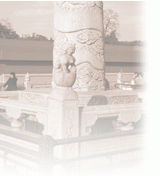| II. Teams in Tibetological Studies |
| 2004-06-13 14:40 |
|
In old China, only a few scholars studied Tibetology
under difficult conditions. In the beginning of the founding
of New China, in order to revitalize Tibetological studies,
the state started to choose and transfer Tibetological
experts of all nationalities, wherever they lived, to
organizations in Tibetan studies, providing them with
excellent working and living
conditions. In June 1961 , the Chinese Government set up the Central Institute for Nationalities in Beijing, The first speciality designated for the Institute was Tibetan language and literature. At that time, a large group of promising youth chosen from universities across the country was sent to study there. This marked the start of new China's training of a team for Tibetan study. With outstanding direction and help from the scholars and experts of the old generation, many young people have become senior specialists in such fiends as the study and teaching of Tibetology, as well as compiling, translating and publishing. In the early days of the 1960s, under the personal interest of late Chinese Premier Zhou Enlai, the Central Institute for Nationalities opened a class for the study of ancient Tibetan language. Famous Tibetan scholars were invited to teach on the topics of Tibetan language and literature, history, religion, philosophy, medicine and astronomy, as well as related studies. The graduates of this class constitute the backbone of today's Tibetan studies. In addition, Northwest China's Institute for Nationalities, Southwest China's Institute for Nationalities, Qinghai Institute for Nationalities and Tibet Institute for Nationalities all have made marked contributions in training qualified personnel specializing in Tibetan studies. Since 1978 , almost one hundred post - graduates of Tibetan studies, among whom Tibetans make up more than one - half , have finished their studies. Meanwhile, a large number of students graduated from other colleges, too, and all of them are now engaged in Tibetan studies. These middle-aged and young scholars do not wish to limit themselves within traditional Tibetan studies, some have published works of high academic quality. Their rise in the academic circle is convincing evidence that china's Tibetan studies have qualified successors. |
|
||||||||||
 |
||||||||||
|
| ||||||||||
|
| ||||||||||
 | ||||||||||
 | ||||||||||
 |
| Home > Topics > China's Tibet > Tibetology in China | |||
|
|
|||
|
| |||